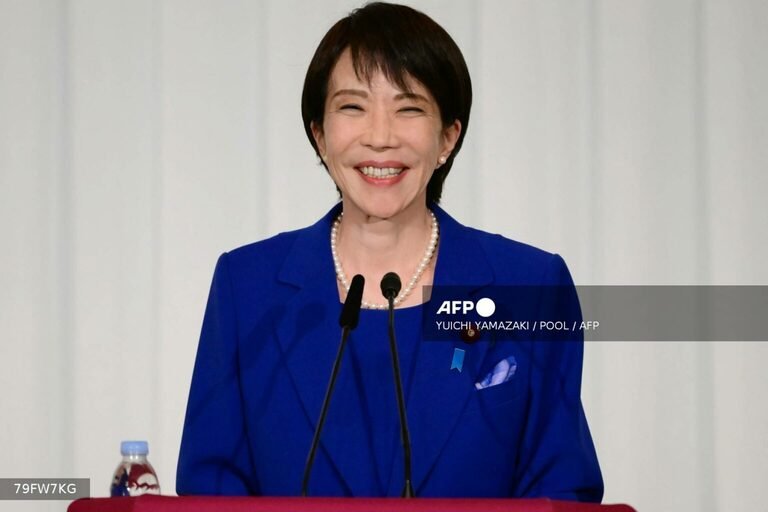Sanae Takaichi, a China hawk and social conservative, became Japan’s first female prime minister on Tuesday after forming an 11th-hour coalition accord.
Japan’s fifth prime minister in as many years will lead a minority administration and has a busy calendar, including a visit from US President Donald Trump next week.
On Tuesday, the lower chamber of parliament chose Takaichi, a Margaret Thatcher admirer, as prime minister after she surprisingly earned a slender majority in the first round of voting.
Looking solemn, the 64-year-old stood and bowed numerous times to lawmakers.
The upper chamber then voted in her favor, albeit in a runoff since Takaichi fell short of a majority. Takaichi will formally assume office after seeing the Emperor later.
On October 4, the former heavy metal drummer became the leader of the Liberal Democratic Party (LDP), which has governed practically nonstop for decades but is losing popularity.
Six days later, the Komeito party left the partnership, citing Takaichi’s conservative views and an LDP slush fund scandal.
Takaichi formed an alliance with the right-leaning Japan Innovation Party (JIP) on Monday evening.
JIP aims to lower the consumption tax rate on food to zero, eliminate corporate and organizational donations, and reduce the number of MPs.
Takaichi pledged to “make Japan’s economy stronger and reshape Japan as a country that can be responsible for future generations.”
“She’s a strong-minded person, regardless of being a woman,” pensioner Toru Takahashi, 76, told AFP in Takaichi’s hometown of Nara.
“She’s not like Trump. But she’s clear about what’s right and wrong,” he said.
Takaichi has promised a government with a “Nordic” number of women, up from two under outgoing Premier Shigeru Ishiba.
According to local media, they might include right-wing Satsuki Katayama in charge of finance and half-American Kimi Onoda as economic security minister.
According to the World Economic Forum’s 2025 Global Gender Gap Report, Japan ranks 118th out of 148 countries. Approximately 15% of lower house MPs are women, and corporate boardrooms are largely male.
Takaichi has stated that she wishes to raise awareness about women’s health issues and has openly discussed her own menopausal experience.
However, she is opposed to amending 19th-century legislation mandating married spouses to share the same surname and believes the imperial dynasty should keep to male-only succession.
Keiko Yoshida, 39, a corporate worker in Nara, told AFP that she thinks Takaichi would “make Japan a more livable place for women.”
“I’d be happy if we saw more policies from a woman’s perspective: support for childcare and help for women returning to work after having children,” agreed student Nina Terao, 18.
The details of Japan’s proposed $500 billion in investments as part of its trade agreement with Washington remain unknown.
Trump also wants Tokyo to cut Russian energy imports and increase defense spending.
“I’d like her to be a prime minister who can clearly say ‘No’ when needed,” Satoshi Sakamoto, 73, another Nara pensioner, told AFP.
Takaichi’s other numerous challenges include reversing Japan’s population decrease and revitalizing the stagnant economy.
With a minority in both houses of parliament, the new alliance will need the assistance of other parties to pass legislation.
Takaichi has previously favored rapid monetary easing and increased government spending, echoing her mentor, former Prime Minister Shinzo Abe.
She previously said that “Japan is completely looked down on by China” and that Tokyo must “address the security threat” posed by Beijing while calling for more security cooperation with Taiwan.
However, she has since toned down her rhetoric and last week avoided the Yasukuni Shrine, which she had previously been to to honor Japan’s war dead.
Takaichi will also be under pressure to turn around the LDP’s fortunes following a succession of dismal election performances that cost Ishiba his job.
Smaller groups gaining support include the populist Sanseito, which refers to immigration as a “silent invasion.”
“Prices have gone up, and it’s tough,” Nara pensioner Satoe Tominaga, 77, told AFP, saying she was “50-50” about Takaichi.
“Honestly, I mostly shop at 100-yen ($0.66) stores now.”










